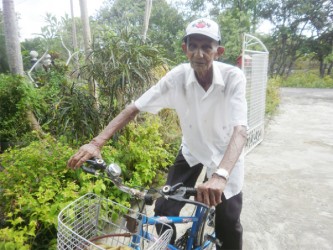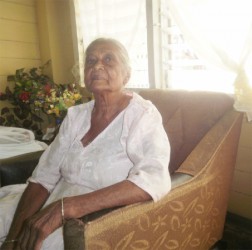On a Monday morning early 83-year-old Iris Mangru heads over to her fruit orchard, something she has been doing for as long as she can remember even though she knows that there is not much she can do there these days.
“I just come over to see wah me could do,” Mangru said as she came out to greet this reporter.
Having just recovered from a serious bout of influenza Mangru was eager to make a trip to the orchard which is opposite her Canefield, Canje, Berbice home.
“Me pickney, a was suh sick dat a say one day to meself is one of two things ‒ a dead or a better feel better,” she said smiling that it was the latter in the end.

And while Iris choose to watch over her orchard her husband of over 50 years, 92-year-old Seepersaud Mangru, rode off on his bicycle to attend the funeral of a friend’s daughter.
It is a wonder that at that age Seepersaud still rides his bicycle, but he told Stabroek News as he rode into his yard on his cycle that it is what keeps him fit.
Seepersaud and Iris Mangru are proud of their achievements and they said that the fruit orchard, which is on land leased to them by the Guyana Sugar Corporation, is what funded their children through school right to university.
Seepersaud’s parents came to Guyana when they were children with their parents who were indentured workers, both of whom have spent a significant portion of their lives working on the sugar estate.
He followed suit and worked in the factory as well as at the Rose Hall estate for some 44 years, while his wife worked in the fields for a number of years before taking early retirement.
They both were married before and became a couple after their respective spouses died, but while Iris had two sons with her previous husband, Seepersaud had no children. Their union produced two children ‒ a boy and a girl.
Honesty
Sharing their thoughts with this newspaper the couple spoke of how hard they had worked and how honestly, but they felt this is not reflected in the young generation.
“Abi days been honest days, we live honest, now people don’t have no time with honesty, me believe one thing: ‘by the sweat from your brow thou shall eat bread,’” Seepersaud said.
“Abi days been a nice days, nobody nah steal, nobody nah interfere with children and all dem things suh, now you can’t trust nobody in this world, I don’t know wha really wrong, pickney; me can’t tell you wah wrong,” he continued.

He said the young don’t want to work and want fast money dishonestly so they cannot enjoy their lives.
He recalled that he started working at the age of 17 and was contented; he was never mistreated while he worked.
“Long time been abi been a very poor… but estate give jobs we nah been a suffer for a job.”
And they no longer get to reap from their orchard because of thieves.
“We nah get nothing, sometimes we have to pick dem things green if we want something,” Iris said with a sad shake of her head.
And for the couple there is just too much hate among races in today’s environment compared to their days when the lived in harmony with all races.
“Now days people a fight matti and suh, me nah know what really wrong,” Seepersaud said.
Iris recalled that their neighbour was of another race and it is she who had taken care of herself and sister when her mother went to work every day, rain or shine.
Remembering his childhood days, Seepersaud said he was the fourth of six children and while growing up their parents never spoke to them about what it was like before.
“Me never talk to me father about India, me never get the kinda zeal,” he said, but one day his father revealed to him the city from which he came.
The fact that his father arrived in Guyana as a child and never have returned to India could have been the reason, since he would have depended on his parents for any information about that country.
While he may not like everything that is happening today, the father and grandfather said he is enjoying his life and is looking forward to making another trip to the US later this year to see his grandchildren. Iris will not be going with him as she “can’t tek the cold and me nah able with the travelling.”
“Abi a wuk, you see, we independent abi nah suffer fuh nothing nether abi nah beg, begging nah a good thing and dah people a do begging, and stealing and robbing,” Seepersaud said.
“Me nah rich man you know, but me guh tell you the other side a deh story, meh nah poor man too,” he said with a laugh.
And while he is proud of his children’s achievements and the role he played in their education he does not want it to come across as if he is boasting.
“Love not to talk and love not to boast, grief come to deh body wah like to boast. Suh pickney learn dem things,” Seepersaud advised.
For Iris she is just happy that her children educated themselves and now have a better standard of living.
“Me use to ask father how me guh backdam and how it use to hard, me don’t want me children have to do dah work me try me best and send dem to school and God answer me prayer; dem tek it and dem wuk and further dem studies,” she said.
And it was not easy for them or their children as she recalled that they were use to “wash dem clothes still it get white but dem a wear it” even as she advised them that they will be able to get better clothes when they educated themselves and started working.
And the work was never confined to the estate or farming as Seepersaud made extra money making gutters while Iris sewed all their curtains, bed sheets and even clothes, although she quickly indicated that she never did it commercially.
One of her sons died when he was 29 years old, and Iris recalled how it affected her mentally to the extent that she had to be treated at the mental hospital.
Speaking about life nowadays, Iris said it is very difficult.
“Life very hard, very tough,” she said pointing out that every day you go to the shop items are sold for different prices and it is never a lower price.
“The money nah been deh long time, abi nah been get all dem things [pointing to her furniture in the house] we get now… but abi been happy you can’t frighten you go in deh in the farm, suh times very, very hard and tough and dangerous,” she said.
Today, the two just live their lives from day to day, still happy that they are alive and can help themselves. Seepersaud is a vegetarian and he does all the cooking except when Iris wants to eat meat, and then she has to face the stove.
She still cleans and maintains her flower plants and ensures that the yard is weeded, while he on the other hand weeds the orchard, because according to her he enjoys it when people comment on the fact that it is so well kept.
And Seepersaud ensures that he reads the newspapers every day while Iris prefers to keep abreast of the news from the nightly newscast.
Seepersaud has every intention of joining all the celebrations for Indian Arrival Day once he is invited and can be transported, while Iris will stay home with her plants and pets ‒ a dog and cat.





